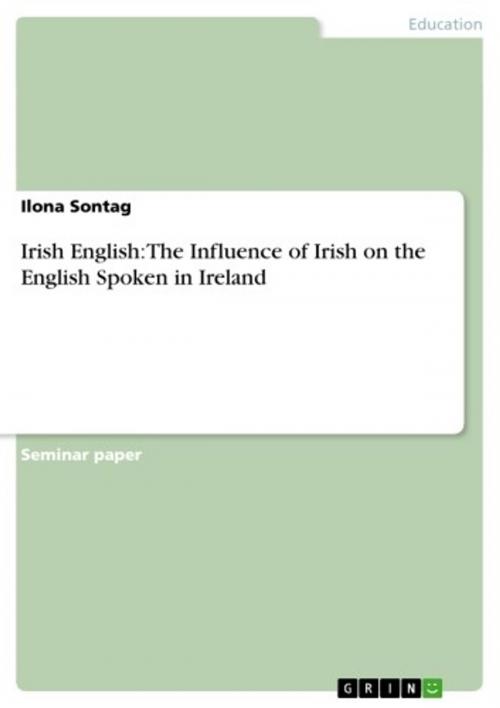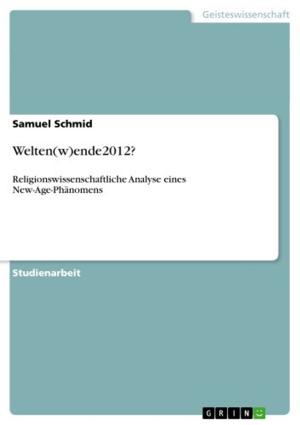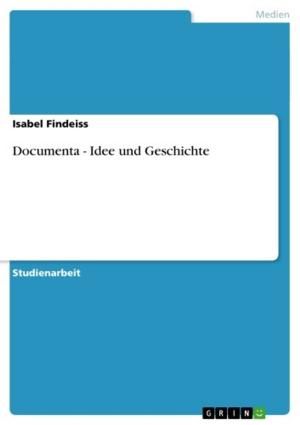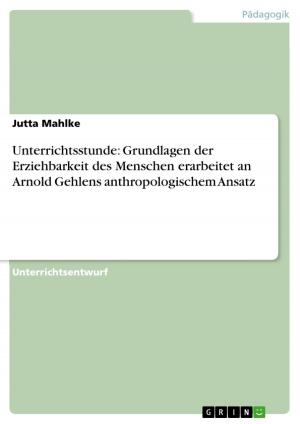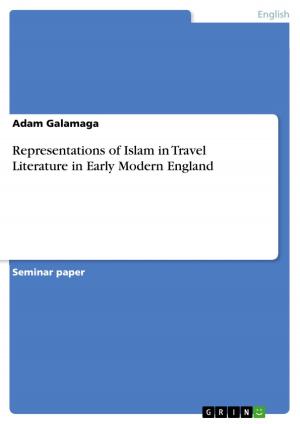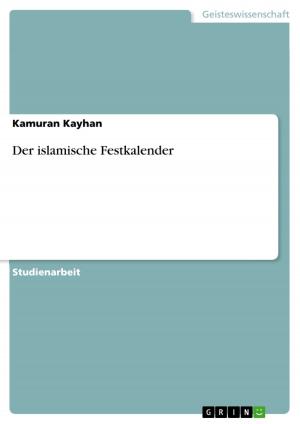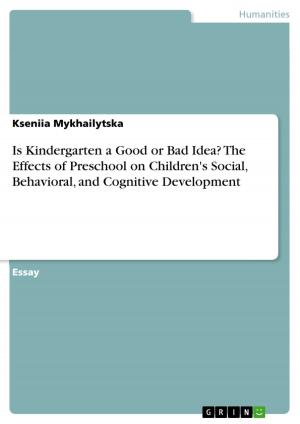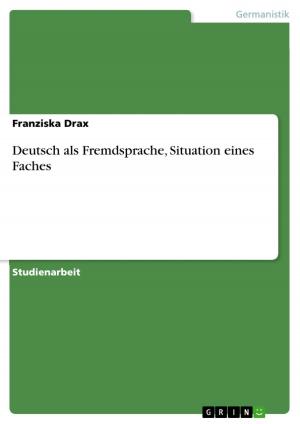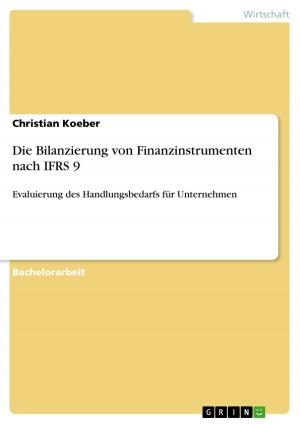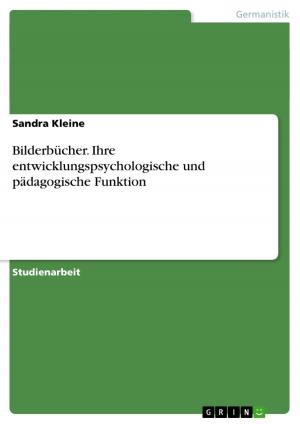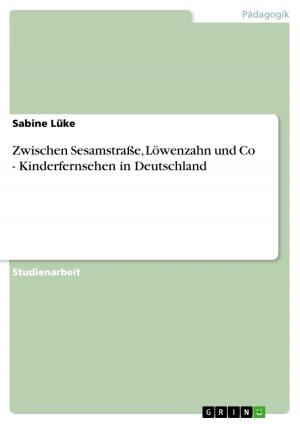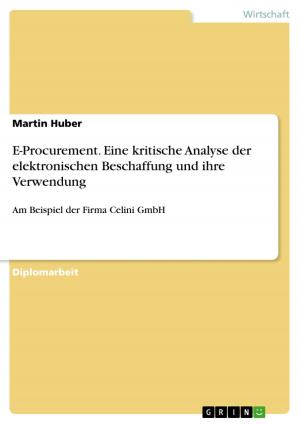Irish English: The Influence of Irish on the English Spoken in Ireland
Nonfiction, Reference & Language, Study Aids, ESL, Foreign Languages| Author: | Ilona Sontag | ISBN: | 9783656381860 |
| Publisher: | GRIN Verlag | Publication: | March 4, 2013 |
| Imprint: | GRIN Verlag | Language: | English |
| Author: | Ilona Sontag |
| ISBN: | 9783656381860 |
| Publisher: | GRIN Verlag |
| Publication: | March 4, 2013 |
| Imprint: | GRIN Verlag |
| Language: | English |
Seminar paper from the year 2010 in the subject English - Pedagogy, Didactics, Literature Studies, grade: 2,3, RWTH Aachen University (Institut für Anglistik: Angewandte Sprachwissenschaft), course: Variety in English, language: English, abstract: Loreto Todd states in his book 'Green English' one very important sentence concerning English in Ireland that depicts the basis on which this term paper is built upon: 'The language spoken in Ireland is similar to the language spoken in England - similar but by no means identical'. This term paper will deal with the kind of English spoken in Ireland today1 and how it differs from English spoken in England or America2, especially taking the influence of the native language of Ireland into account. Because of the space limitations, it will only serve as an overview covering the most important grammatical features in which Irish English (IrE) differs from Standard English (StE), for instance phenomena concerning phonetics, word stress, rhythmic retentions, syntax and semantics. Concerning each field of study some striking features of IrE will be described and explained by the use of examples. It will be of special interest to what extent the differences date back to the influence of the Irish mother tongue Gaelic3. Since English is a relatively new language in Ireland, it will be the aim of this paper to find out if today's linguistic phenomena of IrE can be traced back to the period of the language shift from Irish to English. While by now most of the Irish people's mother tongue is English, it is still probable that the people are still influenced by their past - at least by means of language. Because of this certain approach towards IrE, all the analysed features in this term paper will be a selection of features that somehow have to do with the native language of Ireland. Before the analysis of grammatical features, a brief overlook over the terminology concerning the term 'Irish English' as well as an outline of the history of the English language in Ireland will be given. After the analysis, a last part will be stated in which it will be of interest to how far the Irish accent can be seen as part of the national identity of the Irish people. In the end, a final conclusion will be stated. It is important to mention that although the term IrE is used for a general variety of English in Ireland, a lot of internal distinctions could be made. These accents are linked to different regions and sometimes even differ from city to city. Because of this complexity of the topic, this termpaper will not go into detail concerning the different accents.
Seminar paper from the year 2010 in the subject English - Pedagogy, Didactics, Literature Studies, grade: 2,3, RWTH Aachen University (Institut für Anglistik: Angewandte Sprachwissenschaft), course: Variety in English, language: English, abstract: Loreto Todd states in his book 'Green English' one very important sentence concerning English in Ireland that depicts the basis on which this term paper is built upon: 'The language spoken in Ireland is similar to the language spoken in England - similar but by no means identical'. This term paper will deal with the kind of English spoken in Ireland today1 and how it differs from English spoken in England or America2, especially taking the influence of the native language of Ireland into account. Because of the space limitations, it will only serve as an overview covering the most important grammatical features in which Irish English (IrE) differs from Standard English (StE), for instance phenomena concerning phonetics, word stress, rhythmic retentions, syntax and semantics. Concerning each field of study some striking features of IrE will be described and explained by the use of examples. It will be of special interest to what extent the differences date back to the influence of the Irish mother tongue Gaelic3. Since English is a relatively new language in Ireland, it will be the aim of this paper to find out if today's linguistic phenomena of IrE can be traced back to the period of the language shift from Irish to English. While by now most of the Irish people's mother tongue is English, it is still probable that the people are still influenced by their past - at least by means of language. Because of this certain approach towards IrE, all the analysed features in this term paper will be a selection of features that somehow have to do with the native language of Ireland. Before the analysis of grammatical features, a brief overlook over the terminology concerning the term 'Irish English' as well as an outline of the history of the English language in Ireland will be given. After the analysis, a last part will be stated in which it will be of interest to how far the Irish accent can be seen as part of the national identity of the Irish people. In the end, a final conclusion will be stated. It is important to mention that although the term IrE is used for a general variety of English in Ireland, a lot of internal distinctions could be made. These accents are linked to different regions and sometimes even differ from city to city. Because of this complexity of the topic, this termpaper will not go into detail concerning the different accents.
